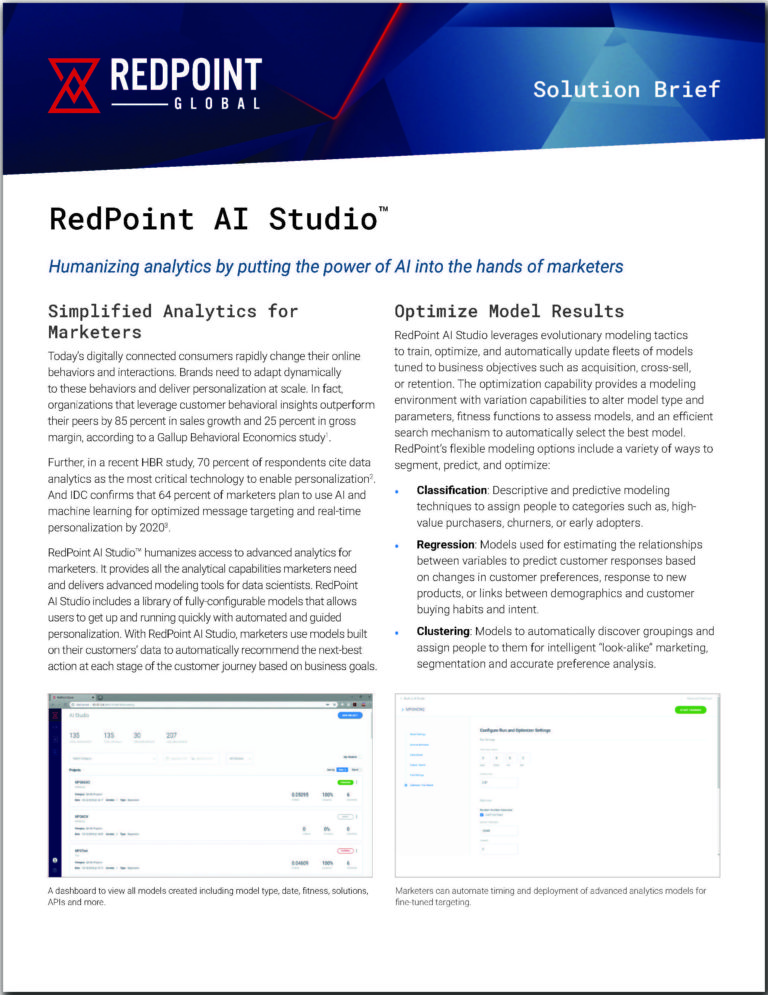 In aviation, senses can play tricks on a pilot. A loss of visual reference can lead to a sensory illusion where a pilot’s perception is the opposite of actual conditions. The next time you board a flight, you can take comfort that your pilot has an instrument flight rating (IFR) and has been trained to rely on an instrument panel even if the readings are counterintuitive to all of their instincts.
In aviation, senses can play tricks on a pilot. A loss of visual reference can lead to a sensory illusion where a pilot’s perception is the opposite of actual conditions. The next time you board a flight, you can take comfort that your pilot has an instrument flight rating (IFR) and has been trained to rely on an instrument panel even if the readings are counterintuitive to all of their instincts.
Many marketers fall prey to a similar type of illusion when it comes to implementing machine learning. They harbor the mistaken belief that delivering a personalized or “human” experience to a consumer requires human input. As counterintuitive as it might seem, the truth is that the more automated the process, and the more it’s driven by analytics, the closer marketing gets to the humanization of the experience for the consumer.
Putting one’s full faith and trust in machine learning is an imperative for marketers to take off and soar with transformative customer engagements that capture the promise of digital transformation.
A Corner Store Experience Across Channels
One of the biggest marketing use cases for machine learning is to build operational models that bring a personalized experience to the consumer, akin to what one might expect from a visit to the corner mom and pop store where the proprietor knows your tastes and preferences inside and out and always seems to have the perfect recommendation every time you visit.
Dynamic, multi-channel, and non-linear customer journeys across physical and digital channels have upended the brand-consumer relationship, but the expectation for personalization remains. One recent study found that 86 percent of shoppers said that personalization had at least “some impact” on what they purchase. The expectation is not limited to a single interaction. BRP’s 2018 Digital Commerce survey revealed that 51 percent of shoppers say it is important to get a personalized experience “across all digital channels within a brand.”
Marketers who cling to the mindset that a human experience requires human input will hire armies of data scientists to build offline models that they think will produce the personalization customers expect, but they’re actually doing the exact opposite; they’re introducing friction because they’re not keeping pace with the customer. There is also the opportunity cost to contend with, as an offline model construct fails to address the influx of data in the time it takes to operationalize the model.
Machine learning provides marketers with the tools that have been missing to manifest the personalized experience at scale, and at the speed necessary to keep up with a consumer across physical and digital touchpoints.
Contextually Relevant Messages at Scale
Machine learning, at its core, is about applying analytics to every shred of customer data. It begins with a single view of the customer. Advanced machine learning models that work with a persistently updated golden customer record will ensure a next-best action recommendation across channels at the cadence of the customer. Working with contextual data adds relevance to the messages, offers, and even non-offers that are eventually delivered to a customer.
This is another important area where human intervention falls short; the smartest data scientists in the world cannot account for all the permutations of a dynamic customer journey. The context that produces one result one minute – a discount offer, an email, a notification – may produce an entirely different result the next minute or even the next second depending on the customer’s next action, new data, or based on a prediction of the customer’s intent.
Humans may think they have a firm grasp on how a customer will behave based on their own experiences as a shopper, a banking customer, and an all-around consumer, but the reality is that every interaction influences the next interaction, and because manual algorithms can’t account for every permutation they must resort to segmentation by cohort.
Contrast that with the capabilities enabled by machine learning – in-line operational modeling marked by 24/7 testing, self-training and continually optimized models with zero human intervention, and a built-in mechanism that detects and incorporates changes to data into subsequent production models. These capabilities turn a clunky manual process into a seamless, sophisticated process that brings marketers much closer to a personalized experience precisely when it will have the most impact. Analytics turns what is essentially a shot in the dark, a guess, into a targeted, personal, and contextually relevant message that will resonate with a consumer.
As the models drive the tactical steps of managing relationships, the marketer is freed to manage at a more strategic level. While this may seem a minor change, it is the very reason that marketers report striking increases in revenue directly attributable to the platform. This is a growing and sometimes surprising effect of stepping back from the tactical control of the day-to-day marketing and enabling a platform that has an environment that fosters analytically driven interactions at scale.
Testing will Yield Quick Wins
Because data is the lifeblood of machine learning, clean, accurate, and updated data is a requirement before implementing machine learning capabilities. Another fundamental requirement is the ability to perform cross-channel marketing with a single view of the customer. With these in place, marketers are well-positioned to begin testing models and validating results irrespective of data or execution issues.
Continual testing and optimized models with machine learning ensure big wins. The only thing needed to get started delivering a relevant, personalized message to every customer with the right context and cadence is to trust the machine over the human, as counterintuitive as it might seem. Trust the instruments, and you’ll guarantee a fast arrival at your destination.
Editor’s Note: George Corugedo will present a keynote session, “How AI & Machine Learning are Humanizing the Customer Experience of the Future” at TRANSCEND19, the Redpoint Global customer conference which will be held April 3-5 at the Seaport Hotel in Boston. The keynote will be Friday, April 5 at 8:30 a.m.
RELATED ARTICLES
Redpoint Customers TRANSCEND Customer Data Limitations to Excel at Engagement
The Role of Collaboration in a Human Approach to AI
3 Reasons Evolutionary Machine Learning Drives Digital Transformation

